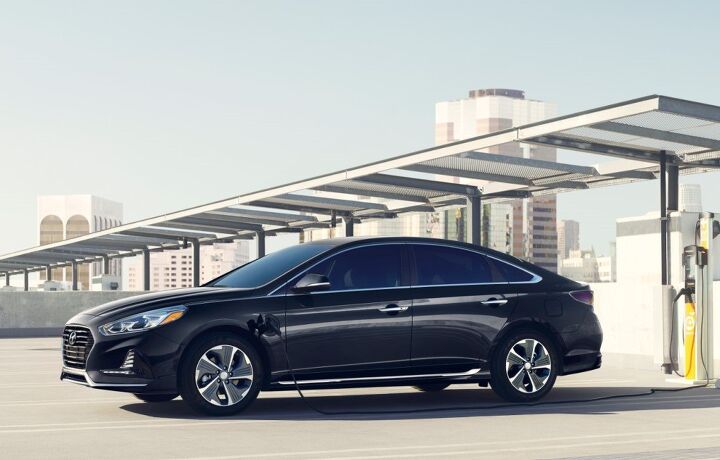Plug-in or Not, Hyundai Doesn't Want to Be Seen as the Expensive Choice

Exclusivity is not a word often associated with Hyundai, and with good reason. Like Nissan (but even more so), Hyundai’s reputation is built on a foundation of mass-produced vehicles with inherent value. And, even in the world of green cars, it seems that game plan can’t change.
So, it’s no surprise to see Hyundai take a hatchet to the price of its 2018 Sonata Plug-in Hybrid. In dropping the model’s entry price by $1,350 and adding one mile of electric driving range, Hyundai hopes it’s enough to attract the attention of would-be buyers. It needs to. In June, the model sat at 21st place on the public’s PHEV shopping list.
Starting now, a Sonata PHEV will set you back $33,350 before a $885 destination charge, while the Limited model grows $250 to $38,850 before destination.
For the base sticker, you’ll see the same 2.0-liter inline four and 50 kWh electric motor, the latter of which is good for 67 horsepower. The transmission remains a six-speed automatic. Hyundai now claims an EV driving range of 28 miles, up from the 27 advertised when the 2018 model debuted at the Chicago Auto Show. Any improvement is a good one, we suppose.
While cutting the entry price obviously adds value to the base model, the Limited’s slight price hike brings many new features aboard — LED headlights with “Dynamic Bending Light,” automatic emergency braking with pedestrian detection, a heated steering wheel, Driver Attention Alert, a wireless charging pad, and a USB port for rear seat passengers.
In a market awash with plug-ins, how has the Sonata fared? Not well, compared to other low-priced PHEVs. Granted, the 2018 model launched well after its Hybrid sibling, meaning that buyers could only source the old-style previous-generation model (even as the stock gasoline-only Sonata’s new design became old hat).
In June, Hyundai sold just 62 Sonata Plug-in Hybrids, a year-over-year drop of 29.5 percent. Over the first half of 2018, the model’s volume shrank by 28.9 percent. Even the plug-in version of the Kia Optima sells better. Year to date, Ford sold more than ten times as many Fusion Energi sedans.
The base Fusion Energi SE, which carries a range of 21 electric miles, stickers for $31,400 before destination — nearly two grand less than the new, cheaper Sonata PHEV.
[Images: Hyundai]

More by Steph Willems
Latest Car Reviews
Read moreLatest Product Reviews
Read moreRecent Comments
- 3-On-The-Tree Lou_BCone of many cars I sold when I got commissioned into the army. 1964 Dodge D100 with slant six and 3 on the tree, 1973 Plymouth Duster with slant six, 1974 dodge dart custom with a 318. 1990 Bronco 5.0 which was our snowboard rig for Wa state and Whistler/Blackcomb BC. Now :my trail rigs are a 1985 Toyota FJ60 Land cruiser and 86 Suzuki Samurai.
- RHD They are going to crash and burn like Country Garden and Evergrande (the Chinese property behemoths) if they don't fix their problems post-haste.
- Golden2husky The biggest hurdle for us would be the lack of a good charging network for road tripping as we are at the point in our lives that we will be traveling quite a bit. I'd rather pay more for longer range so the cheaper models would probably not make the cut. Improve the charging infrastructure and I'm certainly going to give one a try. This is more important that a lowish entry price IMHO.
- Add Lightness I have nothing against paying more to get quality (think Toyota vs Chryco) but hate all the silly, non-mandated 'stuff' that automakers load onto cars based on what non-gearhead focus groups tell them they need to have in a car. I blame focus groups for automatic everything and double drivetrains (AWD) that really never gets used 98% of the time. The other 2% of the time, one goes looking for a place to need it to rationanalize the purchase.
- Ger65691276 I would never buy an electric car never in my lifetime I will gas is my way of going electric is not green email



































Comments
Join the conversation
I would gladly pay more for more horsepower. I imagine a bigger motor + battery would cover that price drop, add range, and give these kinds of cars decent acceleration without affecting gas mileage. I want a hybrid for my next car, but it's gotta run a 14 second quarter mile and burn regular gas. I honestly don't think such a car exists.
Unless gas prices go up more (and stay) up, most drivers (not in high gas price areas) won't see a return on a PHEV. Even a regular hybrid system take years to see a return; however, a 48V mild hybrid system would benefit the typical daily driver.